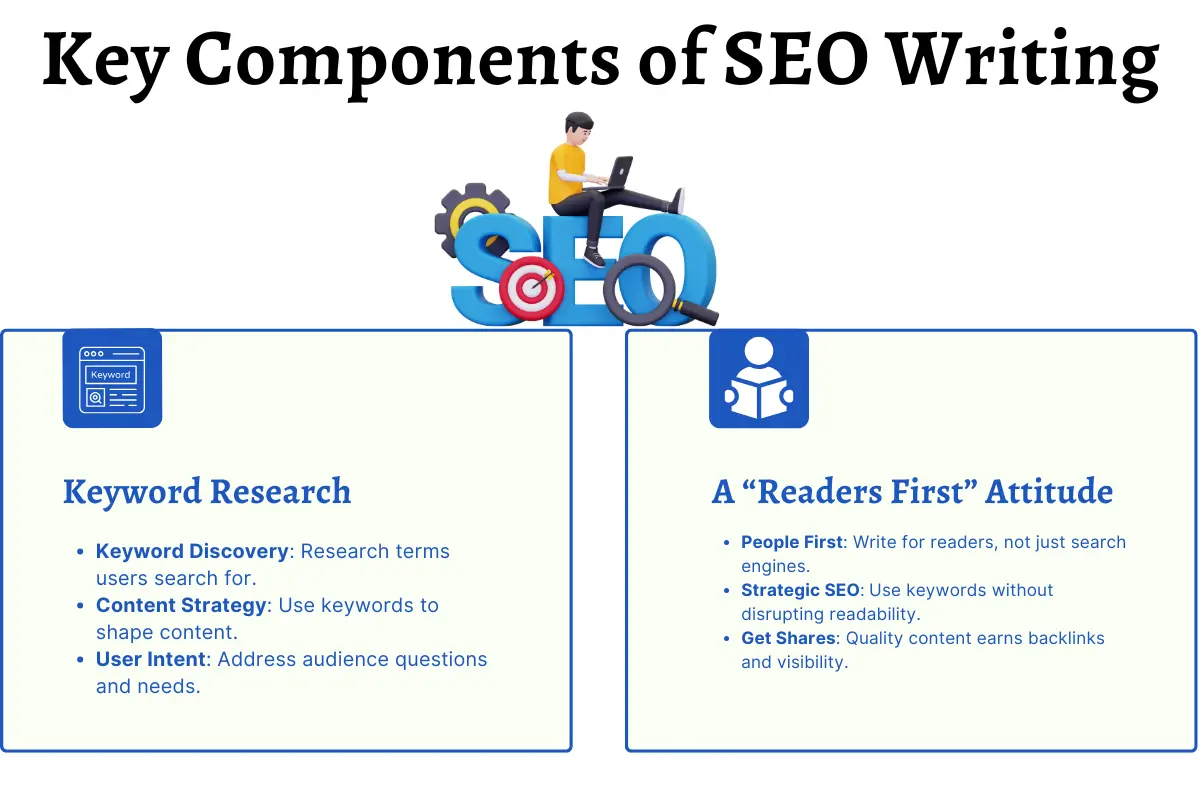Originally published June 8, 2020 , updated on February 16, 2026

Copywriting and SEO writing are often confused, but they serve different purposes.
One may be more important than the other for your business, depending on your goals. Investing in an SEO content writing service can improve your visibility and traffic. Alternatively, a copywriting service might be the better choice if conversions are your main goal.
The thing to remember is that they’re two sides of the same coin. You need BOTH. Understanding the difference between the two allows you to craft better content strategies that will drive engagement, improve search rankings, and ultimately lead to a higher ROI.
The Two Crucial Branches of Content Marketing
SEO writing and copywriting are two essential pillars of content marketing. They each serve a distinct purpose but work together to drive traffic and conversions. Some marketers might say they’re the same, while others claim you only need one. The truth? You need both.
SEO writing is all about making your content discoverable—optimizing it with keywords, answering search queries, and structuring it in a way that ranks well on Google. It attracts organic traffic by providing valuable, informative content that aligns with what people are searching for. Copywriting, on the other hand, is the art of persuasion. It’s crafted to captivate, engage, and inspire action. Whether that’s making a purchase, signing up for a newsletter, or clicking through to another page.
Think of it as telling a story to different people. You’d explain your weekend adventures differently to a close friend than you would to a colleague—choosing your words carefully to suit the listener. Similarly, SEO writing brings the audience in, while copywriting keeps them engaged and encourages them to take the next step.
Understanding both is crucial for any digital marketing strategy. When combined effectively, they ensure your content not only reaches the right audience but also compels them to act—leading to better engagement, stronger brand trust, and ultimately, higher conversions.
What Is Copywriting?
Copywriting is the art and science of writing persuasive content with the goal of encouraging the reader to take a specific action. This can be to make a purchase, sign up for a newsletter, click a link, or engage with a brand. It’s about crafting messages that are persuasive and clear and speak to exactly what your audience is looking for.
You’ll find copywriting everywhere:
- Emails
- Web pages
- Landing pages
- Video/audio scripts
- Social media
Simply put, copywriting is the art of making people take action with just the right words.
What Are the Main Elements of Good Copywriting?
- Audience-Focused Messaging
Copywriters need to develop copy that targets a specific audience. The content needs to address a particular problem or pain point in that target group while making sure to present the brand as a solution. There’s a need to understand the psychology of the target audience and learn to subtly push the right buttons. - Emotional Connection
Copywriting needs to elicit an emotional response from the reader. It’s all about the art of knowing which words to use and which words to leave out. Copywriters use their words to create an experience for the reader. - Clear and Concise Messaging
The best copy is easy to read and gets straight to the point. Long-winded explanations lose attention, while sharp, well-crafted sentences keep readers engaged. Strong copy trims the fluff and delivers a message that’s both impactful and memorable. - Strong Call to Action (CTA)
Every piece of copy should guide the reader toward the next step, whether that’s making a purchase, signing up for a newsletter, or clicking through for more information. A well-placed, compelling CTA turns passive readers into active customers.
When these combine, it’s copywriting gold.
What Is SEO Content Writing?
SEO is the big, confusing elephant in the room for so many people. SEO writing, or on-page SEO, focuses on developing textual content that is both search engine and reader-friendly.
The main mistake people make when crafting this type of content is worrying too much about the search engines and forgetting about the real-life humans they need to target. That’s often where a professional SEO content writing service is beneficial.
SEO writing is only successful if you avoid the following:
- Keyword Overstuffing – when you overuse keywords in your content to try and rank higher on the search engines, but it ends up making the content awkward and hard to read.
- Cloaking – when a website shows different content to search engines and users, hoping to trick search engines into ranking it higher. But it’s a sneaky tactic that can get you penalized.
- Buying Backlinks – this is when you pay for links from other websites to boost your own site’s ranking. This is against Google’s guidelines and can hurt your site’s credibility if you get caught.
Effective SEO content is both informative and user-friendly. It should be scannable, consumable, and easily discoverable.
What are the Key Components of SEO Writing?

- Keyword Research
When conducting keyword research, an SEO writer researches words that people search for about your product or service. Experts use these words (or phrases) to map out a clever strategy for your content. More often than not, these keywords will be used to answer a specific question that readers are asking or to address prevalent thoughts/opinions the audience might have. - A “Readers First” Attitude
Newbie SEO writers will target search engines with their content. Professional writers know that people come first. Yes, it is important to make content crawlable by inserting keywords. However, that doesn’t mean neglecting the reader’s experience. Google ranks content based on user intent and how much time visitors spend on a particular page. Additionally, good content is always shared by readers – this results in tons of backlinks and, ultimately, higher discoverability.
Copywriting vs SEO Writing: Differences and Similarities
The main goal of copywriting and SEO writing is to hook, engage, and convert leads.
That’s the one big similarity. While both disciplines have the same goal, they approach them differently.
| Feature | Copywriting | SEO Writing | Similarities |
| Purpose | Persuades and convinces the reader to take action (e.g., buy, sign up, engage). | Optimizes content to rank higher on search engines and attract organic traffic. | Both aim to increase engagement and conversions. |
| Primary Focus | Emotion-driven, compelling messaging that resonates with the audience. | Keyword-driven content structured for search engines and readability. | Both require audience research to be effective. |
| Writing Style | Engaging, creative, and persuasive with a strong brand voice. | Informative, structured, and optimized for SEO best practices. | Both need high-quality, well-written content. |
| Content Type | Ads, landing pages, sales emails, product descriptions, and social media posts. | Blog posts, website articles, guides, and long-form educational content. | Both can be used on websites and digital marketing materials. |
| Measurement of Success | Conversion rates, click-through rates (CTR), and engagement metrics. | Organic search rankings, website traffic, and time spent on page. | Both contribute to business growth and lead generation. |
| Keyword Usage | Uses persuasive language with minimal keyword emphasis. | Strategically incorporates keywords for search visibility. | Both require strategic word choices to be effective. |
| Call to Action (CTA) | Essential for driving immediate action. | Often includes CTAs but focuses more on educating and informing. | Both guide readers toward a desired action. |
How to Integrate SEO Writing and Copywriting
It shouldn’t be copywriting vs SEO writing. It should be copywriting AND SEO writing. To be able to be found online as well as convert those leads into sales, it’s key to integrate the two. There are a number of ways to do this. Some of these include the following:
- Understand Your Audience’s Search Intent. Know what your audience or potential customer is searching for. Make sure your content provides the answer.
- Write for Humans First. Your writing needs to be natural and engaging. Prioritize readability over robotic, keyword-stuffed content.
- Optimize Without Overstuffing. Use keywords strategically, including in meta titles, descriptions, and naturally within the body of your content. Avoid overloading your text with keywords.
- Compelling Calls to Action (CTAs). Strong CTAs encourage your customers to take action.
- Focus on the User Experience. Short paragraphs, bullet points, and sub-headings structure your content and keep the audience interested and engaged. This is great for user experience and SEO.
- Use Internal and External Links. Linking to relevant content boosts SEO. It also establishes credibility and authority while reducing bounce rates.
- Track, Analyze, and Optimize. Use metrics to evaluate what’s working and what’s not and to understand customer behavior. Then, refine your content strategy for better results.
Tools to Manage SEO Writing vs Copywriting

There are a number of tools you can use to help you with both SEO and copywriting. Isn’t technology great?
SEO Research & Optimization:
- SEMrush – Keyword research, site audits, competitor analysis.
- Ahrefs – Backlink tracking, keyword insights, and ranking analysis.
- SurferSEO – AI-powered content optimization for SEO-friendly structure and readability.
Writing & Editing:
- Grammarly – Improves clarity, grammar, and engagement.
- Hemingway Editor – Enhances readability by simplifying complex sentences.
Content Planning & Management:
- Clearscope – Helps balance keyword usage and writing quality.
- Frase.io – AI-driven tool that streamlines SEO writing and topic research.
- Trello / Asana – Helps teams plan and track content creation.
What’s the Benefit of a Professional Copywriting and SEO Content Writing Service?
While it is possible for businesses to handle SEO and copywriting in-house, hiring a professional copywriting and SEO content writing service provides expertise, efficiency, and measurable results. Here’s why it’s worth the investment:
1. Expertise in SEO and Copywriting Best Practices
Marketers often resort to “black hat techniques” to pump out their version of SEO-optimized content. Unfortunately, without the skills required to craft impactful content, these pieces are often keyword-stuffed and badly structured.
An SEO content writing service understands search intent, optimizes content structure, and stays updated with algorithm changes. Their expertise ensures your content ranks higher and drives consistent traffic.
On the copy side, professional writers know how to tap into what motivates your audience. They craft compelling, persuasive messaging that aligns with your brand voice and encourages action.
2. Saves Time & Resources
Creating high-quality, SEO-optimized content takes time. A dedicated SEO content writing service allows you to focus on business growth. Let the experts handle content strategy, writing, and optimization.
A copywriting service will save you from spending hours agonizing over the right messaging, clarity, tone or the perfect call to action. You will get polished, impactful copy without the stress.
3. Higher Conversion Rates
Great SEO writing isn’t just about attracting visitors. Once you’ve got them, you need to convert them! A professional team blends SEO techniques with persuasive copywriting to turn traffic into leads and sales.
Skilled copywriters know how to guide readers through the customer journey, using emotional triggers and strategic language to turn interest into intent and intent into action.
4. Consistency & Scalability
A content writing service ensures regular, high-quality output that aligns with your brand voice and marketing goals. They also ensure consistency in your tone and messaging across platforms. This builds trust and recognition with every interaction. Plus, as your business grows, it can scale efforts without compromising quality.
5. Data-Driven Strategy
SEO content writing services use advanced tools to analyze performance, identify opportunities, and continuously optimize content for better rankings and engagement.
In the same vein, on the copywriting front, professional copywriters use performance insights to refine messaging and test different calls to action to get better results from your target audience.
6. Improved Authority & Credibility
Well-researched, valuable content positions your brand as an industry leader and builds trust with your audience—essential for long-term success. The Google algorithm prevents lackluster content from ranking. So you need solid, well-written content packed full of value if you want to succeed at the SEO game.
Likewise, great copywriting builds credibility by clearly communicating your value proposition and speaking directly to your customer’s needs. It’s the difference between sounding like just another brand and becoming the brand they remember.
If you’re serious about taking your content strategy to the next level, hiring an SEO content writing service ensures you get the best of both worlds: high-ranking content that converts. Ultimately, they’ll guide you toward a content marketing strategy that will work for you.
Post Views: 1724




















